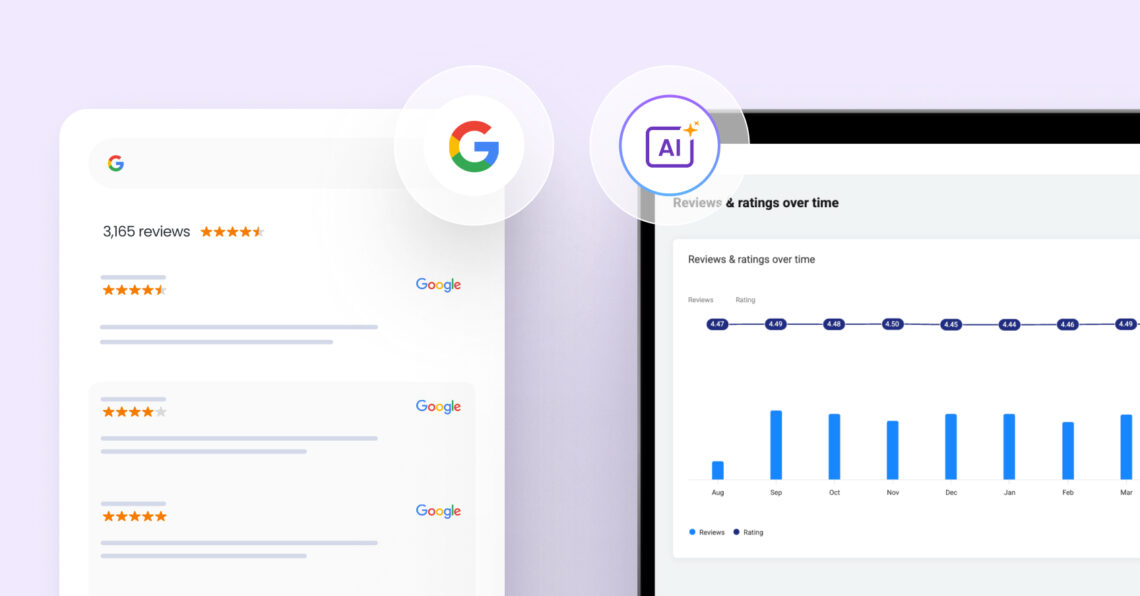The Google review management software market is surging, projected to grow from $3.77 billion in 2025 to $7.75 billion by 2034. This growth reflects how central online reviews have become to consumer trust and business reputation.
What’s fueling this momentum? Two defining forces are shaping the market more than anything else: the rise of AI automation and stricter compliance with Google’s review policies.
For businesses, this means the old playbook of manual review collection and templated replies is no longer enough. Customers now expect personalization, while Google demands strict authenticity standards.
At the same time, AI-powered tools from automated review generation to intelligent AI review replies are enabling brands to scale reputation management while reducing operational drag.
In this blog, you’ll learn how to pick, compare, and measure ROI on the best Google review software of 2025, with a close look at how AI automation and analytics are reshaping the field.
Table of contents
Why Google reviews drive revenue
Google reviews have moved far beyond social proof; they are now a direct driver of revenue growth. Studies from BrightLocal show that 87% of consumers read online reviews before engaging with a business. Even more striking, a one-star rating increase can boost revenue by up to 9%.
Key business impacts include:
- Local SEO lift: Google reviews directly affect visibility in the local map pack
- Trust and credibility: Star ratings instantly shape customer perception
- Conversion impact: More reviews = higher purchase confidence
For multi-location businesses, scaling reviews means scaling revenue.
Impact on local search ranking
Google explicitly factors reviews into its ranking algorithm under the principle of prominence. Businesses with more, fresher, and higher-quality reviews often outrank competitors.
Ranking factors include:
- Average rating (higher is better)
- Review velocity – the speed at which new reviews appear
- Keyword usage in reviews (e.g., “best dentist near me”)
- Review recency (fresh feedback carries weight)
Together, these signals combine to enhance local pack visibility, providing businesses with a tangible competitive advantage.
Influence on consumer trust and conversions
Beyond algorithms, reviews shape human decision-making. Star ratings serve as instant indicators of trust, significantly influencing purchasing decisions. Research reveals that 92% of consumers hesitate to buy from businesses with ratings below four stars, underscoring the significant impact of Google review software management solution on conversions.
Case study: How Moss & Company scaled review management across 300+ locations
Moss & Company, a property management firm with over 14,000 apartment units and 300+ locations, struggled with reviews scattered across multiple rating sites and no streamlined process to track or respond. Staff had to manually check platforms, making it hard to manage feedback consistently.
With Birdeye, Moss centralized reviews from every property into one dashboard, enabling the team to monitor, sort, and respond quickly. Automated review requests through Yardi integrations boosted feedback collection at critical touchpoints like move-ins, move-outs, and service requests.
Results with Birdeye:
- 62% increase in new reviews
- 141% more reviews responded to
- Centralized visibility into sentiment and property-level performance
- Actionable insights to guide staff training and improve service quality
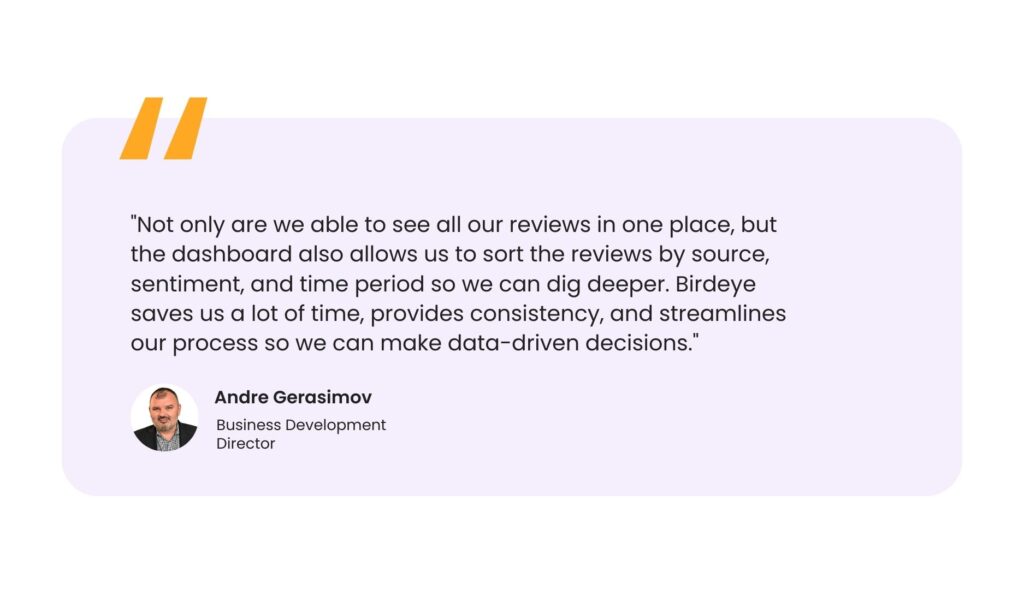
Learn more about Birdeye and Moss & Company case study
Key criteria for Google review software
Selecting the best Google review platform in 2025 requires evaluating multiple factors that impact both effectiveness and compliance. The right Google ratings tools must combine AI automation, omnichannel review generation, advanced analytics, and built-in compliance safeguards.
Here’s a practical checklist to help evaluate platforms that not only boost your Google ratings but also deliver measurable ROI.
AI automation and smart replies
Modern Google review software management solution leverages natural language processing (NLP) to generate authentic responses that maintain brand voice consistency. Advanced sentiment-aware AI systems like Birdeye’s Reviews AI analyze review context, emotional tone, and business-specific information to craft personalized responses that sound genuinely human.
The distinction between basic auto-templates and sophisticated AI is crucial:
- Basic templates: Generic responses that feel robotic
- Advanced AI: Context-aware replies that adapt to sentiment, incorporate review details and business personality
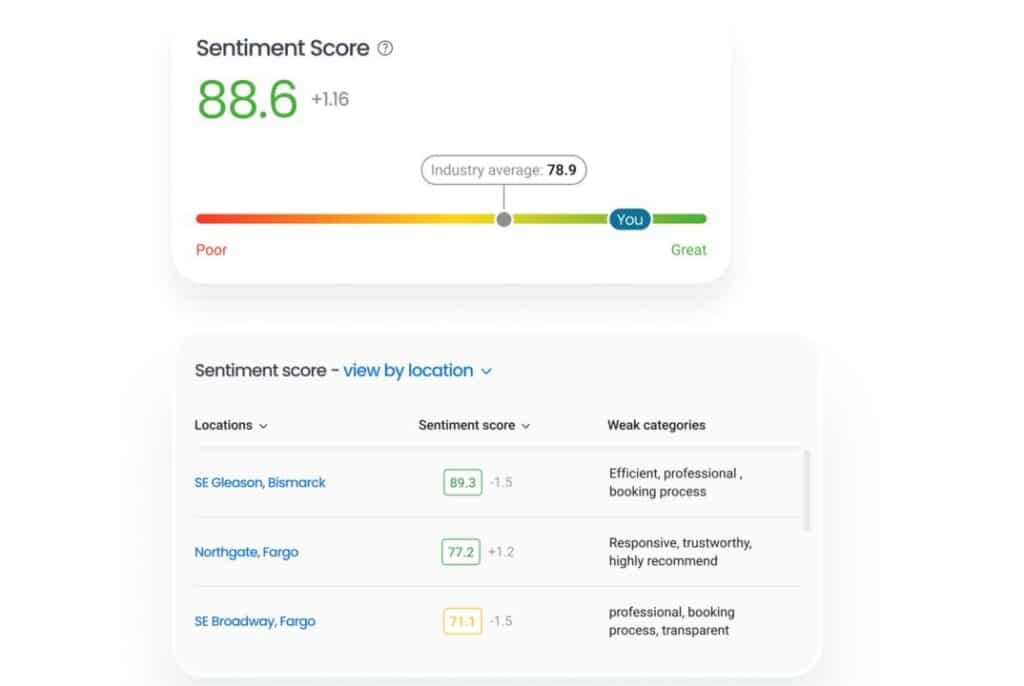
Sentiment analysis plays a vital role here, defined as the process of using NLP to classify opinion as positive, negative, or neutral, enabling appropriate response strategies for different review types. For example, empathetic replies to negative reviews and enthusiastic reinforcement for positive ones.
Pro Tip: Look for AI systems that allow human oversight and editing before publishing responses, ensuring quality control while maintaining efficiency.
Review generation and request channels
Maximizing review generation and response rates requires using the proper channels at the right time. The best platforms enable outreach through SMS, email, QR codes, and WhatsApp integration, providing customers with multiple ways to leave feedback and increasing the likelihood that they’ll respond.
Channel performance varies significantly:
- SMS: 98% open rate, ideal for immediate post-purchase review requests
- Email: 20% open rate, suitable for follow-up sequences
However, compliance is critical. Google’s policy explicitly prohibits incentives for reviews, making organic request strategies essential. Effective platforms like Birdeye ensure request channels follow Google guidelines while maximizing response rates through timing and personalization.
Pro Tip: Send review requests 24–48 hours after purchase, giving customers time to experience your product or service fully before sharing feedback.
Analytics, reporting, and ROI tracking
Comprehensive analytics separate professional-grade platforms from basic tools. Must-have metrics include:
- Star distribution: Breakdown of ratings across 1-5 stars
- Response time: Average time to respond to reviews
- Keyword sentiment: Topics mentioned in positive vs. negative feedback
- Revenue attribution: Connection between review improvements and sales outcomes
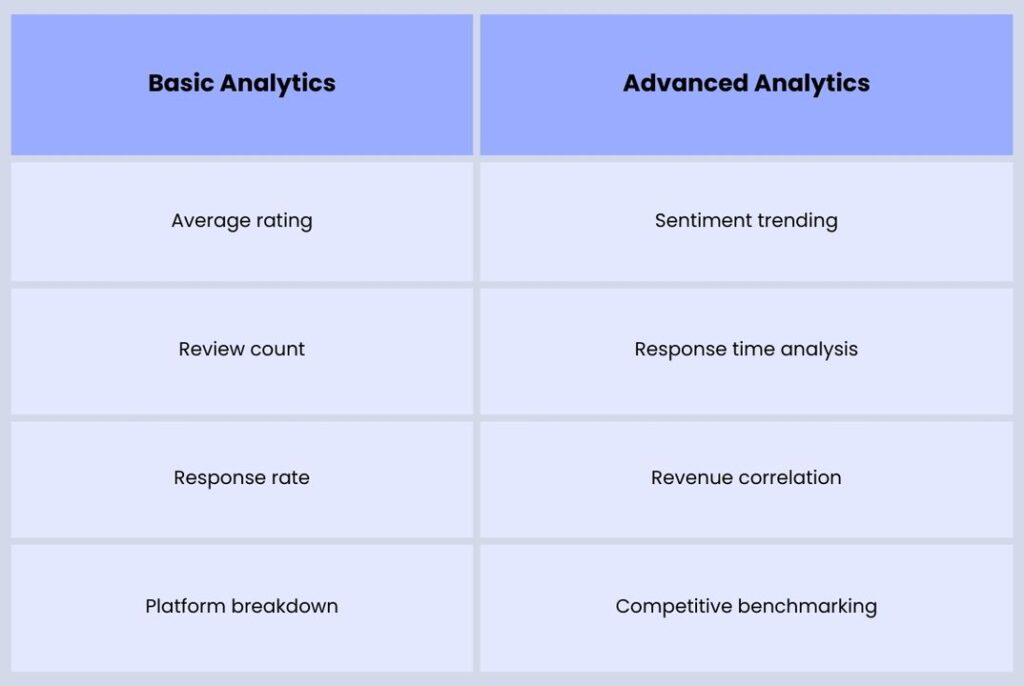
Advanced platforms provide automated alerts for negative reviews and multi-location roll-ups for enterprise users, enabling proactive reputation management across dozens or hundreds of sites.
Compliance with Google policies
Google continuously updates review policies, making compliance features essential. Your chosen platform should actively prevent policy violations through built-in safeguards.
Compliance checklist for review software:
- Flags suspicious review patterns
- Enforces one review request per customer
- Logs proof of legitimate review requests
- Prevents review-gating practices
Do you know? Review gating refers to the prohibited practice of filtering customers before asking for public reviews (e.g., only asking satisfied customers to leave Google reviews). Quality review platforms prevent this automatically.
Comparison of top Google review management software 2025
Understanding platform differences through side-by-side comparison saves research time and ensures you select the best Google review management software for your specific needs.
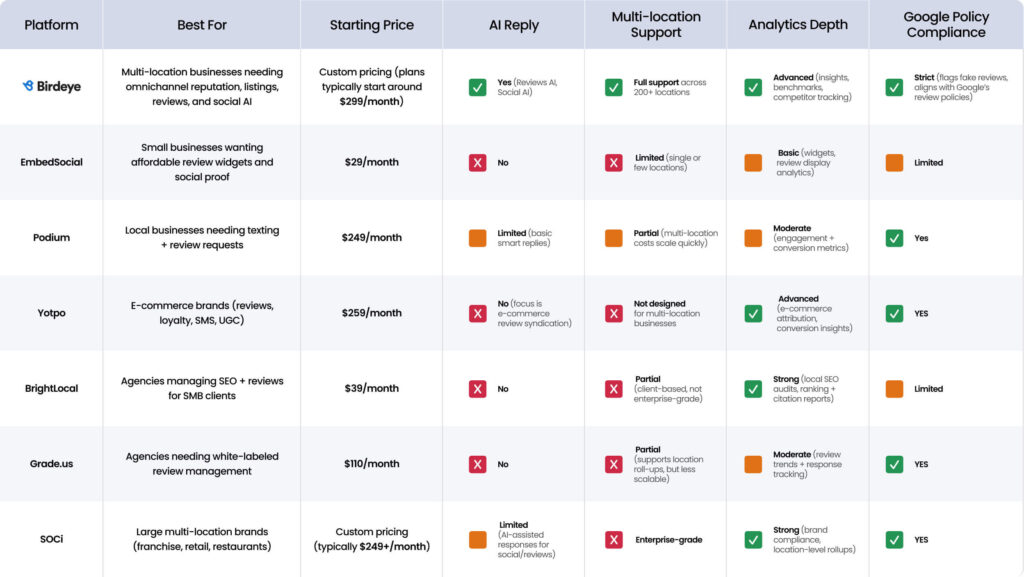
Notes:
- ✅ = strong/available, ❌ = not available, 🟧 = limited/basic.
- Prices are approximate published entry-level rates (actual enterprise/multi-location deals are higher).
- Birdeye and SOCi are the only platforms in this list built primarily for multi-location business scalability.
Google review software management solution: Best for small businesses
Budget-conscious small businesses should prioritize affordability under $50/month while maintaining essential features, such as SMS invites and intuitive dashboards.
EmbedSocial offers the most accessible entry point at $29/month, providing basic review management and generation tools.
Birdeye’s Essentials plan comes loaded with superior AI capabilities and Google certification, giving businesses powerful tools to optimize reviews and reputation at scale. While the plan is higher-priced, the investment is offset by the depth of automation and compliance built in.
As Brandon Hegland, VP of Marketing at The Michaels Organization, explains:
“What we didn’t like about reputation.com that helped us choose Birdeye was the high-pressure sales and the higher price by $20k/yr. We are happier with Birdeye because support is amazing, and we trust that Birdeye is expanding its functionality to be competitive with Reputation.com. The price difference helped seal the deal. We evaluated functionality, and Birdeye does more than enough to make it work.”
With enterprise-grade support and continuous innovation, Birdeye proves its value well beyond the initial cost.
Pro Tip: Small businesses should prioritize SMS-based review requests over email, as they generate four times higher response rates and require less effort from customers.
Best review management software: For multi-location brands
Franchise operations and multi-location businesses require centralized controls with location-specific roll-ups. Grade.us and SOCi excel in this category, offering hierarchical permissions that allow corporate oversight while enabling local management autonomy.
Essential features for multi-location include:
- Bulk response capabilities across all locations
- Cross-location benchmarking and performance comparison
- Corporate brand guideline enforcement
- Location-specific reporting and analytics
Smarter tools to track, respond, and win with every review.
Want to see the impact of Birdeye on your business? Watch the Free Demo Now.
Review management software: Best for agencies and enterprises
Digital agencies and enterprise clients need white-label solutions, API access, and advanced analytics capabilities. Birdeye, Vendasta, and Reputation lead this segment with comprehensive feature sets, including:
- Multi-account dashboard management
- Reseller pricing structures
- SLA support and dedicated account management
- Advanced API integration capabilities
Pro Tip: Enterprise clients should negotiate custom integrations with existing CRM and customer service platforms to maximize workflow efficiency.
Choosing the right platform for your business
Selecting best Google review management software requires matching platform capabilities with specific business needs and constraints.
Persona-based decision framework
Every business approaches review management with different priorities. The right software depends on your size, structure, and goals.
Here’s a framework with three common buyer personas, their decision criteria, and quick recommendations.
1. Local retailer
- Top priorities: Affordable pricing, simple setup, increased foot traffic, and quick review generation.
- Budget range: $50–$200/month.
- Must-have features: Automated review requests, mobile-friendly dashboard, Google Business Profile integration, basic sentiment insights.
If-then recommendation:
- If you want full AI automation that goes beyond requests, such as automated responses, sentiment analysis, and listings management, Birdeye Listings AI is the better long-term solution.
- If you’re looking for a simple and affordable tool to request reviews, Podium Essentials is a great option to start with.
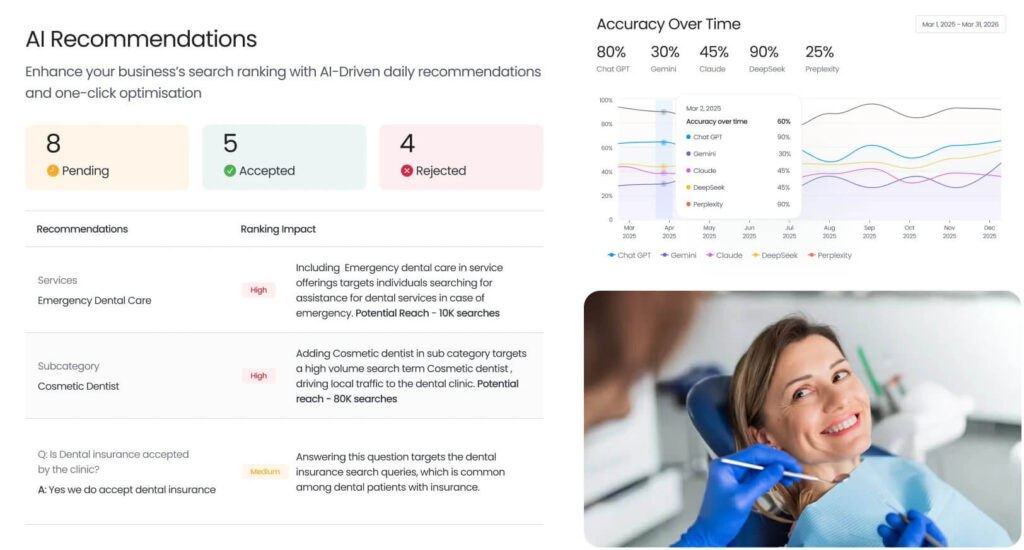
2. Multi-location franchise
- Top priorities: Brand consistency, scalability, centralized visibility across hundreds of profiles, fraud/fake review detection, and local SEO improvement.
- Budget range: $500–$3,000+/month (depending on the number of locations).
- Must-have features: Enterprise-grade AI automation, sentiment analysis, multi-location dashboards, listings management, and competitive benchmarking.
If-then recommendation:
- If you’re managing 10, 100, or even 1,000 stores, Birdeye Reviews AI is considered a top review management platform for 2025. It centralizes everything, integrates with 3,000+ apps, and scales across locations while using AI to detect fake reviews and generate on-brand responses.
- If you need basic monitoring across multiple locations, Reputation.com offers enterprise reputation tracking but with less AI automation.
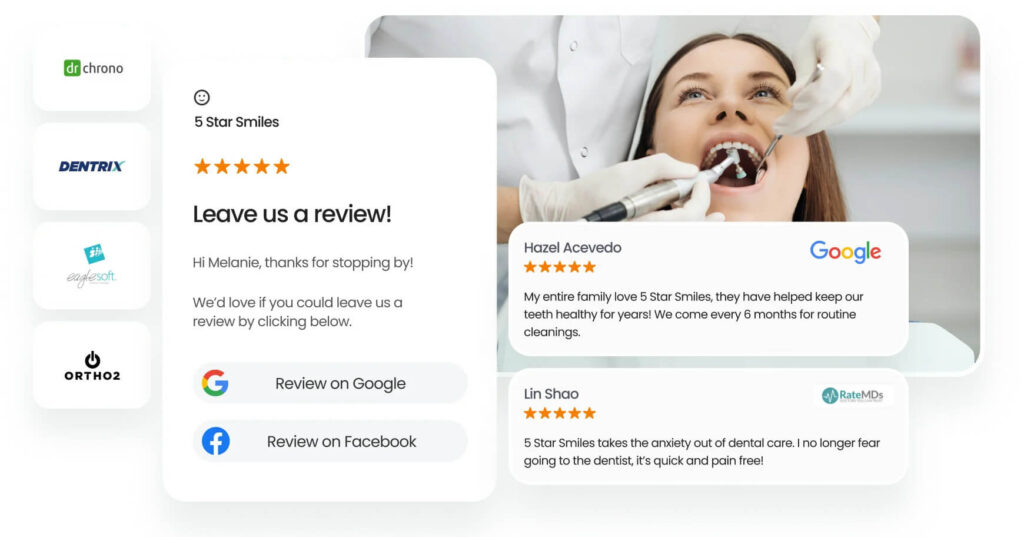
3. Digital agency
- Top priorities: Client reporting, white-label features, cross-platform management (Google, Facebook, Yelp, industry-specific), and automation to reduce manual workload.
- Budget range: $300–$1,500/month (depending on client volume).
- Must-have features: Multi-client dashboards, AI insights for campaign performance, auto-generated responses, integrations, and reporting analytics.
If-then recommendation:
- Suppose you need advanced AI insights, cross-platform automation, and customizable reporting at scale, Birdeye Insights AI equips agencies with competitive benchmarking, AI-driven sentiment analysis, and automation that drives measurable ROI.
- If you need a lightweight option for basic reporting, Grade.us provides a white-label review request platform for agencies.
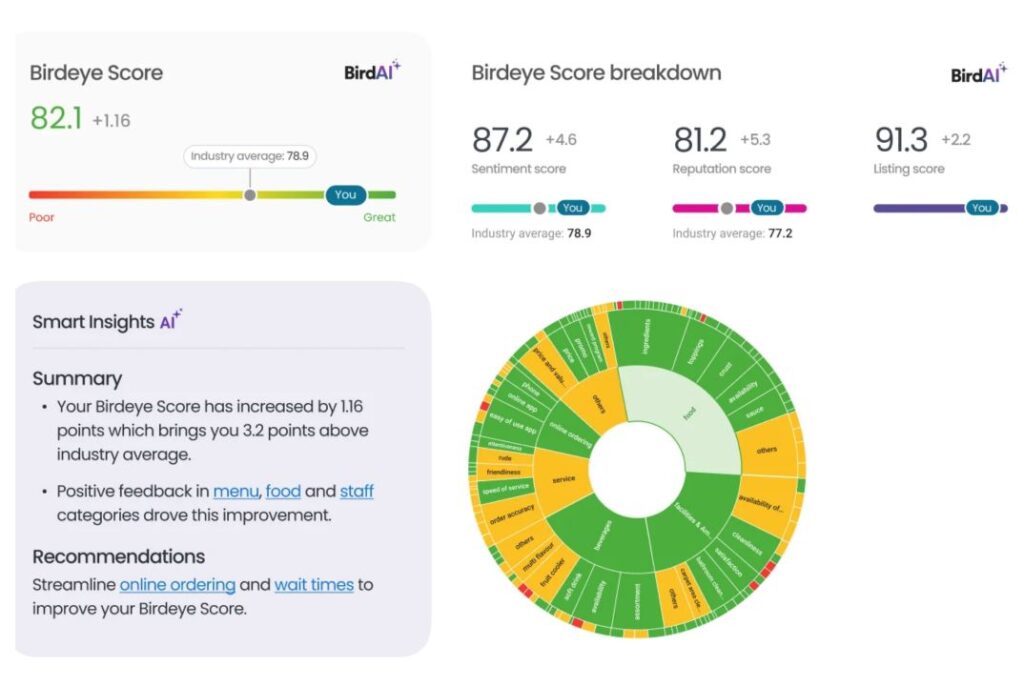
Implementation timeline and integrations
One of the most significant advantages of modern Google review management software 2025 is how quickly a business can go from sign-up to securing its first new review. A typical rollout is both structured and fast, ensuring minimal disruption for teams:
- Account setup (Day 0–1): Once you sign up, your account is provisioned instantly. Admins can define roles, permissions, and branding preferences so the foundation is ready from day one.
- Location syncing & Google Business Profile connection (Day 1–3): Each business location is synced, and profiles are connected directly to Google Business Profile. This step ensures accurate review capture, central visibility, and policy-compliant publishing.
- Template customization & AI reply training (Day 3–7): Review request templates are tailored to your tone and customer journey. AI reply systems are trained on your brand voice and industry context, so responses are not only fast but also on-brand.
- Staff training & go-live (Week 2): Teams are onboarded with hands-on training. From there, the system goes live, review requests start flowing, automated responses are enabled, and analytics dashboards begin populating with insights.
Seamless integrations accelerate adoption. The best platforms connect with your CRM, POS, and help desk software to automate requests at natural customer touchpoints. For advanced workflows, Zapier and open APIs extend flexibility, making it easy to tie review management into existing tech stacks without a heavy IT lift.
Pro Tip: Begin with a single location or limited user group for initial testing before full deployment across all locations.
Success metrics to monitor
To prove ROI from the best Google review management software, businesses need to track measurable KPIs rather than just activity. The most reliable success metrics include:
- Average star rating: Your baseline indicator of reputation. Even a small lift (e.g., from 4.2 to 4.5) can shift consumer trust and click-through rates.
- Review volume growth: Track how many new reviews you generate each month. Growth signals stronger customer engagement and higher visibility in Google’s local ranking algorithm.
- Response time: Measure how quickly staff respond to reviews. Faster replies (within 24–48 hours) improve customer satisfaction and signal active reputation management to Google.
- Sentiment score: AI sentiment analysis reveals the emotional tone of reviews. Monitoring positive vs. negative sentiment trends helps spot service gaps early.
- Revenue impact: Tie reviews to business outcomes; higher ratings often correlate with increased calls, bookings, and website visits from Google Business Profile.
Pro Tip: Set quarterly checkpoints to review trends across these KPIs. Use the data to adjust strategies such as testing new review request templates, experimenting with response tone, or running A/B tests on message timing. These controlled tests help validate which approaches actually increase review volume and improve customer perception.
FAQs about Google review software management solution
Birdeye’s AI agents analyze review sentiment, apply business context, and keep responses on-brand. Staff can review and edit before publishing, ensuring authenticity. The system learns from edits over time, making replies smarter and more natural.
With Birdeye, businesses see a 20-30% increase in reviews and scale up their revenue growth. Automation boosts local SEO, customer trust, and saves 10–15 hours weekly, translating into both cost savings and new revenue.
Birdeye, a Google-certified partner, helps you to stay compliant with Google’s review policies. It blocks incentivized requests, logs every invitation, and flags suspicious activity. Staying compliant is simple: never gate reviews or offer discounts for feedback.
Choose platforms with SOC 2 Type II or ISO 27001 certification. Birdeye ensures encryption, role-based access, GDPR compliance, and secure APIs, meeting enterprise-grade security needs.
The effective platforms combine AI search optimization with review management. The best Google review management software like Birdeye Reviews AI not only manage Google reviews but also ensure your brand is cited accurately in AI search results. By unifying reviews, listings, and sentiment tracking, Birdeye helps multi-location businesses stay visible and trusted.
AI automation enables businesses to respond in seconds rather than days. With features like LLM-powered suggested replies and sentiment detection, software such as Birdeye ensures every review gets a fast, brand-safe response. Faster replies improve customer trust and increase the likelihood of being recommended in AI-generated answers.
Yes. Advanced platforms use LLM-driven sentiment analysis and pattern recognition to flag suspicious or harmful reviews. Birdeye, for example, identifies inconsistencies, highlights reputation risks, and guides businesses on next steps. This proactive detection improves brand accuracy in AI search results and helps prevent negative sentiment from shaping how AI engines describe your business.
Conclusion
The Google review management software landscape in 2025 offers unprecedented opportunities for businesses to automate reputation management while maintaining authenticity and compliance. Thus, managing Google reviews is about converting insights into stronger trust and business growth. Ask yourself:
- Do you know how fast your team’s response time really is?
- Are you acting on every alert when a customer leaves a review?
- Can you easily manage reviews across locations and save time while doing it?
- Do your tools provide real-time notifications, allowing you to respond quickly before issues escalate?
This is where Birdeye makes the difference. With AI-powered automation, certified Google integrations, and enterprise-grade scalability, it equips businesses to stay ahead.
You’ll capture authentic reviews, get smarter customer insights, respond faster, and ultimately drive more revenue from every customer interaction.
The businesses that win in local search tomorrow will be those that automate intelligently, monitor continuously, and optimize every touchpoint today.
Ready to put your review strategy to the test? Watch a Birdeye demo and see how smarter review management helps you save time, respond faster, and grow stronger.

Originally published
